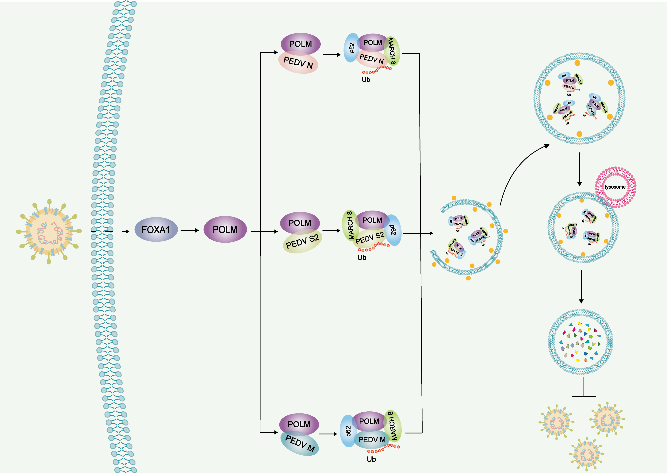
Recently, the scientists from SHVRI of CAAS found that POLM inhibited Porcine epidemic diarrhea virus replication by degrading multiple viral structural proteins.
Research Background
Porcine Epidemic Diarrhea (PED), as a PEDV-induced infectious intestinal condition typified by diarrhea, emesis, dehydration and anorexia, leads to death rates as high as 100% among suckling piglets. Given the existing commercial vaccines, it is essential to study host-virus interactions and formulate efficient antiviral regimes.
Research Update
This study concerned a host factor POLM (a DNA polymerase family member) exerts an antiviral effect against PEDV proliferation. Our results indicated that POLM expression was increased following PEDV infection and were regulated by the transcription factor FOXA1. In addition, our findings indicated that POLM targeted and degraded PEDV structural proteins (N, S2, M) by autophagy pathway to inhibit PEDV proliferation. POLM could recruit the E3 ubiquitination ligase MARCH8 for N, S2, M proteins ubiquitination, which were subsequently recognized by p62, a cargo receptor, for translocation to the autophagic lysosome, therefore degrading the N, S2, M protein and preventing PEDV proliferation. In summary, we showed a novel therapeutic target for combating PEDV which is using the POLM-MARCH8-p62-autophagosome pathway to degrade the PEDV N, S2, M proteins.

Fig.1 Antiviral mechanisms of POLM
Funding
This study was supported by the National Key Research and Development Program of China, National Natural Science Foundation of China, and Natural Science Foundation of Shanghai. Xinyu CAO, a joint graduate student from the SHVRI CAAS and Xinjiang Agricultural University, Associate Professor Yingyu LIU from Xinjiang Agricultural University, and Associate Researcher Wu TONG from SHVRI CAAS are the first authors of the paper. Associate Researcher Ning KONG and Researcher Tongling SHAN from SHVRI CAAS are the co-corresponding authors.
The Original Link
https://pubmed.ncbi.nlm.nih.gov/39927776/

